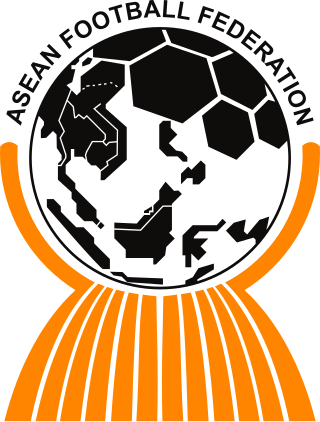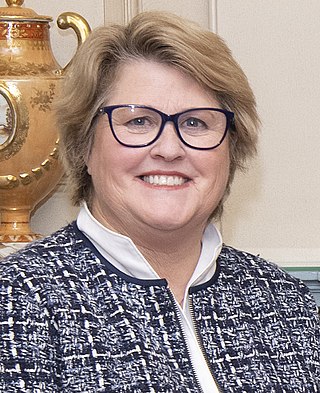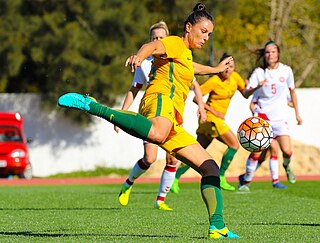Related Research Articles

The Oceania Football Confederation (OFC) is one of the six continental confederations of international association football. The OFC has 13 members, 11 of which are full members and two which are associate members not affiliated with FIFA. It promotes the game in Oceania and allows the member nations to qualify for the FIFA World Cup.

Football Australia is the governing body of soccer, futsal, and beach soccer within Australia, headquartered in Sydney. Although the first governing body of the sport was founded in 1911, Football Australia in its current form was only established in 1961 as the Australian Soccer Federation. It was later reconstituted in 2003 as the Australian Soccer Association before adopting the name of Football Federation Australia in 2005. In contemporary identification, a corporate decision was undertaken to institute that name to deliver a "more united football" in a deliberation from the current CEO, James Johnson. The name was changed to Football Australia in December 2020.

The Asian Football Confederation (AFC) is the governing body of association football, beach soccer, and futsal in most countries and territories in Asia. The AFC was formed in 1954. It has 47 members. The Asian Ladies Football Confederation (ALFC) was the section of AFC that managed women's association football in Asia. The group was independently founded in April 1968 in a meeting involving Taiwan, British Hong Kong, Malaysia and Singapore. In 1986, ALFC merged with AFC.

The West Asian Football Federation (WAFF) founded in 2001, is a regional sub-confederation of football, governed under the Asian Football Confederation, for nations in West Asia. The WAFF consists of 12 member associations.

The ASEAN Football Federation (AFF) is an organisation within the Asian Football Confederation (AFC) and is an international governing body of association football, futsal, and beach soccer in Southeast Asia. It consists of the federations of Australia, Brunei, Cambodia, East Timor, Indonesia, Laos, Malaysia, Myanmar, Philippines, Singapore, Thailand, and Vietnam. However Australia is geographically not Southeast Asian.

In Australia, Soccer, also known as British football, is the most played outdoor team sport, and ranked in the top ten for television audience as of 2015. The national governing body of the sport is Football Australia (FA) which comprises nine state and territory member federations, which oversee the sport within their respective region. The season in Australia is played during the summer, to avoid clashing with Australian rules and Rugby league which dominant spectator and media interest there.

The Australia men's national soccer team represents Australia in international men's soccer. Officially nicknamed the Socceroos, the team is controlled by the governing body for soccer in Australia, Football Australia, which is affiliated with the Asian Football Confederation (AFC) and the regional ASEAN Football Federation (AFF).

Alen Stajcic is an Australian football manager and former player, and is the current manager of Western Sydney Wanderers in the A-League. He was the head coach of the Philippine women's national football team from 2021 to 2023. While as a footballer he was a NSW Premier League player and an Australian Youth Representative.
The Australian women's national under-20 soccer team represents Australia in international women's under-20 soccer. The team is controlled by the governing body for soccer in Australia, Football Federation Australia (FFA), which is currently a member of the Asian Football Confederation (AFC) and the regional ASEAN Football Federation (AFF) since leaving the Oceania Football Confederation (OFC) in 2006. The team's official nickname is the Young Matildas.

Mary Virginia Harvey is an American retired soccer goalkeeper. She was the starting goalie for 1991 U.S. Women's National Team which won the inaugural 1991 FIFA Women's World Cup; and a member of the 1996 Olympic Gold Medal team. Harvey retired from international competition in 1996 following the Atlanta Olympics.

Australia submitted an unsuccessful bid for the 2022 FIFA World Cup. On 2 December 2010 FIFA announced that the event would be held in Qatar. Australia also lodged a bid for the 2018 FIFA World Cup, but withdrew the bid on 10 June 2010. The 2018 and 2022 World Cups were the twenty-first and twenty-second editions of the FIFA World Cup. The bidding procedure to host both the 2018 and 2022 FIFA World Cup began in January 2009, and national associations had until 2 February 2009 to register their interest. Frank Lowy, Ben Buckley, Quentin Bryce and Elle Macpherson presented the bid.

The Australia women's national soccer team is overseen by the governing body for soccer in Australia, Football Australia, which is currently a member of the Asian Football Confederation (AFC) and the regional ASEAN Football Federation (AFF) since leaving the Oceania Football Confederation (OFC) in 2006. The team's official nickname is "the Matildas" ; they were known as the "Female Socceroos" before 1995.

Emily Gielnik is an Australian professional soccer player who plays as a forward for Melbourne Victory and the Australia women's national team. She previously played for Aston Villa W.F.C. in England, Brisbane Roar and Melbourne Victory in her native Australia, Liverpool in England, Urawa Red Diamonds in Japan, Avaldsnes IL in Norway, Bayern Munich in Germany, and Vittsjö GIK in Sweden.
Sonia Gegenhuber is a retired Australian soccer player who played 75 times for Australia and was a national captain.
Mahfuza Akhter Kiron is a Bangladeshi football administrator and a member of the FIFA Council.
The 1991 OFC Women's Championship was the fourth OFC Women's Championship of women's association football. It took place in Sydney, Australia from 19 to 25 May 1991. Only three teams participated in the tournament, and a total of six matches were played. This edition served as the OFC's qualifying tournament for the inaugural FIFA Women's World Cup.

The Australia–New Zealand bid for the 2023 FIFA Women's World Cup, also known as the AsOne bid, was the successful bid to host the 2023 FIFA Women's World Cup made by Football Federation Australia (FFA) and New Zealand Football (NZF). The joint bid was announced on 12 December 2019, combining an already launched effort from Australia that began on 29 October 2018. The bid entailed 13 venues in 12 host cities, with a final played in Sydney at Stadium Australia.
Chris Nikou is the current chairman of Football Federation Australia and an Australian lawyer.
Heather Lynne Reid AM is a former Australian football administrator and an advocate for gender equity, diversity and inclusion in sport, particularly in the world game of football. From 2018 to 2021, she was a member of the Football Australia Board.
James Johnson is an Australian sports administrator and business person who has served as CEO of Football Australia since January 2020. He is also a non-executive advisory board member of the Association Football Development Program Global chaired by Prince Ali bin Hussein of Jordan. Johnson has spent the bulk of his career in the global sports industry and is a highly regarded global sports executive. Johnson has been a featured speaker at sports forums and conferences in areas, including, the international transfer system, financial fair play, multi-club ownership, salary caps, as well as the globalisation, commercialisation, and business of sports. Johnson spent the early period of his career as a lawyer practicing in the areas corporate law, litigation, and industrial relations.
References
- ↑ "Moya Dodd is first Australian representative on FIFA". University of Adelaide. Retrieved 11 December 2014.
- 1 2 "AFC Executive Committee". The Asian Football Confederation . Retrieved 10 December 2014.
- 1 2 "Moya Dodd scores for women's soccer". The Sydney Morning Herald. 30 May 2014. Retrieved 10 December 2014.
- ↑ Smithies, Tom (15 May 2007). "Lowy shakes up soccer board". The Daily Telegraph . Archived from the original on 5 October 2012. Retrieved 1 June 2011.
- ↑ "FFA welcomes outcome in Asia". Football Federation Australia. 8 May 2009. Archived from the original on 11 October 2012. Retrieved 1 June 2011.
- ↑ Glass, Alana. "The Case For FIFA's Gender Reform". Forbes. Retrieved 4 April 2019.
- ↑ "Dodd's election loss exposes FIFA gender reform farce". Sports Illustrated. Retrieved 4 April 2019.
- ↑ "Moya Dodd disappointed to lose FIFA spot". The World Game. Special Broadcasting Service. Australian Associated Press. 9 May 2017. Retrieved 21 June 2019.
- ↑ "Teams of the Decades – Women's 1990–1999". Football Federation Australia. 21 December 2013. Retrieved 26 April 2017.
- ↑ Howe, Andrew. "Official Media Guide of Australia at the FIFA Women's World Cup Germany 2011" (PDF). Football Federation Australia. p. 53. Retrieved 26 April 2017– via WomenSoccer.com.au.
- ↑ Settimi, Christina. "Moya Dodd, One Of Soccer's Most Powerful Women, Isn't Done Playing". Forbes. Retrieved 4 April 2019.
- ↑ Merritt, Chris (27 June 2008). "G+T beats the benchmark for promoting women". The Australian. Archived from the original on 3 October 2014. Retrieved 1 June 2011.
- ↑ "100 Women of Influence 2016". The Australian Financial Review. 20 October 2016. Retrieved 21 June 2019.
- ↑ Stewart, Claire (28 October 2016). "Global aims drive winners". The Australian Financial Review.
- ↑ Settimi, Christina. "Moya Dodd, One Of Soccer's Most Powerful Women, Isn't Done Playing". Forbes. Retrieved 29 March 2018.
- ↑ "King's Birthday 2023 Honours - the full list". Sydney Morning Herald. Nine Entertainment Co. 11 June 2023. Retrieved 11 June 2023.